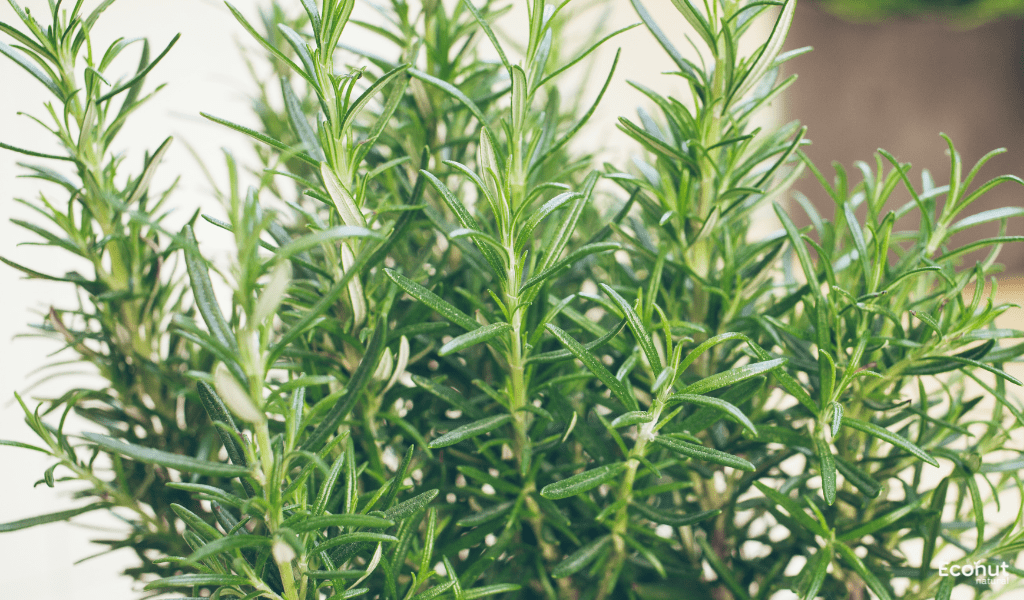Rosemary (Rosmarinus officinalis) is a common household herb. It belongs to the Lamiaceae family. With long, leathery leaves that resemble needles, it’s a dense evergreen shrub. Foods and drinks can be flavored with the plant. Of all the components of rosemary, caffeic acid and rosmarinic acid are most important. These compounds provide rosemary its therapeutic and health-promoting qualities.
Because of its antioxidant properties, rosemary oil is good for skin because it helps to prevent wrinkles and other indications of age. In men, it also encourages hair regrowth by enhancing blood circulation in the scalp. Because rosemary oil has anti-inflammatory qualities, you can also use it to massage your joints.
Description
In Ayurveda, rosemary is referred to as Rujamari. It is a fragrant therapeutic herb. It is well-known for its essential oil, which is extensively utilized in the production of fragrances and soaps. In addition, it has aesthetic and culinary value.
Botanical Name:
Rosmarinus officinalis
Family:
Lamiaceae
Leaves:
The plant appears to be grayish-green in color. The thick, leathery leaves have a powdered white, hairy underside and a dark green upper surface that resembles needles.
Flowers:
Little clusters of two or three pale blue, pink, or white flowers grow along branches. Clusters of the tiny blooms cling to the branches.
Habitat:
Native to the arid, rocky regions of the Mediterranean, particularly the coast, is rosemary. The Latin terms ros and marinus, which together mean “dew of the sea,” are the source of the genus name Rosmarinus. Using rosemary dates back to the ancient Greeks and Romans.
Parts Used:
- Leaves
- Whole plant
Dosage:
- Tea – 2 to 4gm
- Water – Twice a day
- Oil – Twice daily
Chemical Constituents
Camphor, borneol, 1, 8-cineole, and α-pinene are often the primary components of rosemary oil. Better-quality oils are those that have higher concentrations of borneol and 1,8-cineole and lower concentrations of camphor and α-pinene.
Types of Rosemary
- Prostratus
- Golden Rain
- Albus
- Arb
Other Language Names of Rosemary Leaves (Rosmarinus officinalis)
French name – Feuilles de romarin
Spanish name – Hojas de romero
Italian name – Foglie di rosmarino
Scientific Classification
| Kingdom | Plantae |
| Subkingdom | Tracheophyta |
| Superdivision | Spermatophyta |
| Division | Magnoliophyta |
| Class | Lamiales |
| Family | Lamiaceae |
Rosemary Leaves (Rosmarinus officinalis) Uses
- It encourages more lymph and blood flow.
- It is used to treat headaches, epilepsy, and stomach issues.
- For hair issues, rose water oil is helpful.
- Additionally, it enhances memory, eases muscle soreness, and stimulates the neurological, circulatory, and rheumatic systems.
Rosemary Leaves (Rosmarinus officinalis) Benefits
Improvement of digestion:
After lunch or dinner, you can have a cup of rosemary tea, which aids with digestion by lowering acid and gas. It may lessen bloating in the abdomen and appetite loss.
Promotes hair growth:
It is well known that rosemary oil stimulates hair follicles, resulting in increased hair growth and decreased hair loss. It may also improve circulation on the scalp, reducing flakes and dandruff.
Provides Antioxidants:
Eating rosemary can help fight oxidative stress and strengthen the immune system because of its rich supply of antioxidants and bioactive compounds. Additionally, it has a reputation for fostering good circulation and fending off inflammation, both of which can cause pain.
Excellent diuretic:
Diets aimed at decreasing retained fluid and losing weight can benefit greatly from the use of rosemary tea, an effective natural diuretic. This tea makes more urine, which encourages the body to get rid of fluid and accumulated toxins, improving health in general.
Fights diseases:
Rosemary combats a wide range of illnesses and infections that weaken the body’s defenses against sickness. The body uses antioxidant molecules as a supplementary defense mechanism in addition to its immune system. These potent substances are found in considerable amounts in rosemary, including rosmarinic acid, betulic acid, caffeic acid, and carnosol.
Promote liver health:
Rosemary can help with headaches brought on by binge eating or drinking (especially when the food is heavy in fat). Liver function can also be improved by it.
Diabetes:
Rosemary tea boosts insulin and decreases glucose; it can also help manage diabetes. However, drinking this tea should not take the place of a good diabetic diet or prescription medicine. It should only be used in addition to medical care.
Boots the production of red blood cells:
As a stimulant, rosemary increases the body’s generation of red blood cells and blood flow. This keeps the body’s essential organ systems oxygenated and ensures that their metabolic processes are operating normally. Additionally, it facilitates the movement of nutrients to damaged cells.
Rosemary Leaves (Rosmarinus officinalis) Side Effects
Digestive Distress:
If you consume too much rosemary, it might irritate your intestines and stomach, causing unpleasant symptoms like nausea and vomiting.
Kidney Concerns:
Rosemary can strain your kidneys to the point of possible injury at very high doses.
Pregnancy Complications:
Large rosemary consumption during pregnancy should be avoided as it may trigger menstruation and increase the chance of miscarriage.
Also Read: Curry Leaves, (Murraya koenigii) – Benefits, Uses & Side Effects
Conclusion
The rosemary plant generally doesn’t need much care, but inadequate growing circumstances and upkeep could leave it susceptible to disease and pest infestations. While many common issues with rosemary may be fixed if caught early, others, if left untreated, can weaken and eventually kill the plant.
FAQS
What is rosemary (Rosmarinus officinalis) used for?
Rosmarinus officinalis, sometimes known as rosemary, is a common spice in cookery, especially in Mediterranean cuisine. It is also used as a fragrance ingredient in soaps and cosmetics. In medicine, rosemary has long been utilized.
Can hair grow back with rosemary oil?
Overall study results indicated that rosemary oil may help with some kinds of hair growth. Furthermore, evidence that rosemary oil can stimulate hair growth was found in a study conducted in 2022.
Are there any negative effects of rosemary?
Excessive amounts of rosemary may cause sun sensitivity, emesis, and skin irritation. When applying rosemary oil topically, most people might not have any issues. It could cause allergic reactions in certain persons. Most people may be able to safely inhale rosemary when used as aromatherapy.

